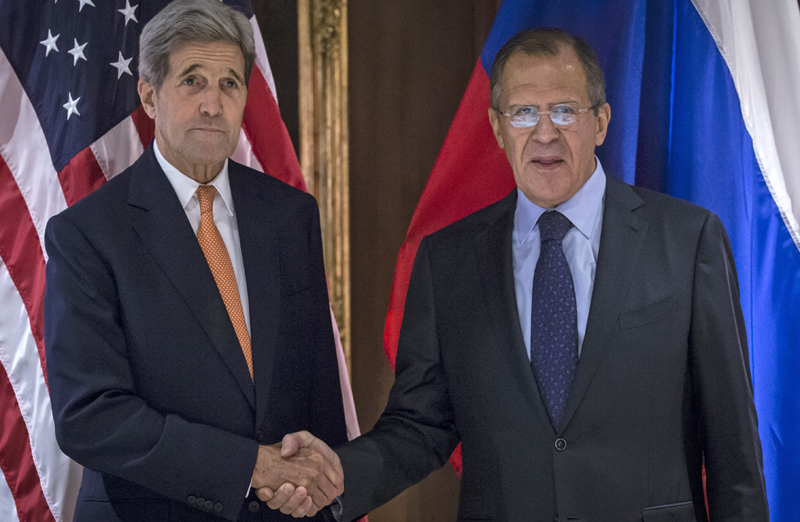Kerry, in Vienna, seeks diplomatic solution to Syrian war
VIENNA: US Secretary of State John Kerry and his Russian, Saudi and Turkish counterparts met in Vienna on Friday, seeking to revive a moribund effort to end Syria's civil war.
Kerry began a day-long series of meetings at a luxury hotel in the Austrian capital with Saudi Arabian Foreign Minister Adel al-Jubeir, Turkish Foreign Minister Feridun Sinirlioglu, both of whom share the US view that Syrian President Bashar Assad must go if the conflict is to be resolved. Kerry met separately with Russian Foreign Minister Sergey Lavrov, whose country is Assad's prime backer. The four ministers then held a group encounter.
Speaking after talks with Jordanian Foreign Minister Nasser Judeh, who was also in Vienna but not present at the group meetings, Lavrov called on other countries to step up efforts to bring peace to Syria. Perhaps more importantly, though, he announced that Russia and Jordan had agreed to coordinate their military activities in Syria. Lavrov said the two countries would set up a center in the Jordanian capital to coordinate their air campaigns over Syria. No details were given.
None of the other participants in the talks had spoken to reporters by late afternoon.
On Thursday in Berlin, Kerry said one focus of the talks would be to consider "a broader participation of very necessary countries, all of whom need to be at the table" to discuss the way forward in Syria. Russia is keen to bring Assad's other main supporter, Iran, into the talks, but Saudi Arabia in particular is opposed.
Kerry said all the countries with an interest in Syria, including Iran and Russia, agree on what the result should be: a unified, secular and pluralistic Syria governed with the consent of its people.
"One thing stands in the way of being able to rapidly move to implement that, and it's a person called Assad — Bashar Assad," he said. "So the issue is, can we get to a political process during which time the future devolution and allocation of power in Syria is properly allocated by the people of Syria? And that's what we're working towards. So my hope is that these talks can begin a process that could open up a greater discussion."
Syria is in its fifth year of a civil war that has killed hundreds of thousands, contributed to a massive refugee crisis in Europe and been complicated by the emergence of the Islamic State group and Russia's direct military intervention.
Friday's meeting in Vienna — site of the world's last major international diplomatic success, the Iran nuclear deal in July — follows a surprise visit by Assad on Tuesday to Moscow. There, he and Russian President Vladimir Putin discussed Russia's military operations in Syria that the U.S. and others say are bolstering Assad and not targeting Islamic State militants, as Russia claims.
Putin said Thursday Assad had told him he is ready to dialogue with his political foes. Putin defended Russia's bombing campaign, saying it would set the stage for peace talks.
A military victory over the militants "will not solve all problems, but it will create conditions for the main thing: a beginning of a political process to encompass all healthy, patriotic forces of the Syrian society," Putin said. His words echoed those of Syrian government officials who have expressed readiness to negotiate with the "patriotic" opposition — a term generally used to describe unarmed, mostly Damascus-based government critics who are tolerated by Assad.
The Kremlin said Putin also talked by phone with the leaders of Turkey, Saudi Arabia, Egypt and Jordan about Syria. Kerry plans to travel to Jordan late Friday and then Saudi Arabia.






